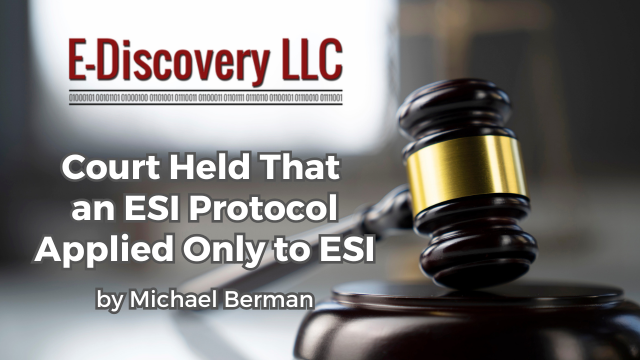
[EDRM Editor’s Note: The opinions and positions are those of Michael Berman.]
In Skeans v. Atlantic Marine Corps Communities, LLC, 2025 WL 1298299 (D.S.C. May 5, 2025), the privilege logging term of the parties’ ESI Protocol did not determine when privilege logs for non-ESI material had to be provided. In short, the ESI Protocol applied only to ESI.
“The present suit arises from Defendants’ operation of the Laurel Bay military housing community. Plaintiffs bring a host of claims against Defendants arising from their time as tenants at a rental property….” Id. at *1.
Plaintiffs complained that defendants provided only generalized privilege objections in response to discovery. Plaintiffs asserted that the failure to provide a timely and specific privilege log waived the privilege.
In response, defendants relied on the ESI Protocol that provided for privilege logs to be served within 60 days of a party’s final production. In other words, defendants asserted that the ESI Protocol gave them 60 days after final production to serve a privilege log that addressed both ESI and non-ESI material and therefore, they were not untimely
“Plaintiffs reply that ‘the ESI Protocol is limited in application to the production of electronically stored information (ESI)’ and ‘does not apply to the parties’ written responses or withholding of non-ESI materials.’” [Emphasis in original].
The court apparently agreed and ordered that defendant “produce a corresponding privilege log for any materials that are not governed by the Parties’ ESI Protocol within twenty-one (21) days of this Order.” [Emphasis in original].
In short, by its terms, the ESI Protocol apparently governed only privilege logs relating to ESI.
Michael Berman, E-Discovery LLC.
In short, by its terms, the ESI Protocol apparently governed only privilege logs relating to ESI. See generally An ESI Protocol Saved the Day for the Discovering Party (Apr. 15, 2025) (where a court wrote that: “Where a dispute arises as to the production of ESI, an ESI protocol that has been mutually entered into by the parties will govern so long as the protocol addresses the issue.”).
Of course, the agreement could have been drafted more broadly if the parties so desired, or the parties could have agreed to a “discovery plan” governing all discovery. For a discussion of the important differences between an “ESI Protocol” and a “Discovery Plan,” please see “ESI Protocol” v. “Discovery Plan” (Jan. 2, 2024).
Of course, the agreement could have been drafted more broadly if the parties so desired, or the parties could have agreed to a “discovery plan” governing all discovery. For a discussion of the important differences between an “ESI Protocol” and a “Discovery Plan,” please see “ESI Protocol” v. “Discovery Plan” (Jan. 2, 2024).
Michael Berman, E-Discovery LLC.
On a separate issue, Plaintiffs argued that defendant improperly objected to “certain standard interrogatories provided by the South Carolina Rules of Civil Procedure….” Standard interrogatories generally provide a “safe harbor” for the discovering party and the Skeans court ordered amended responses.
One other interesting issue was that defendant objected “to eight of Plaintiffs’ interrogatories by referring to a forthcoming production.” Plaintiffs’ motion to compel asserted that this response did not comply with Fed.R.Civ.P. 33(d), which permits reference to documents “if the burden of deriving or ascertaining the answer will be substantially the same for either party….”
The Skeans court agreed and:
To the extent that Defendant has not supplemented its responses to Plaintiffs’ Interrogatories and Requests for Production, the Court finds that AMCC PM’s answers lack the specificity required by Rule 33(d) by failing to “specify[ ] the records that must be reviewed, in sufficient detail to enable the interrogating party to locate and identify them.” The Court orders AMCC PM to amend its answers to Plaintiffs’ Interrogatories Nos. 4, 8, 9, 10, 11, 12, 15, and 17 by responding with specificity as to where in its document production Plaintiffs can locate the information responsive to each interrogatory. [Emphasis in original].
Skeans v. Atlantic Marine Corps Communities, LLC, 2025 WL 1298299 (D.S.C. May 5, 2025).
Assisted by GAI and LLM Technologies per EDRM GAI and LLM Policy.


